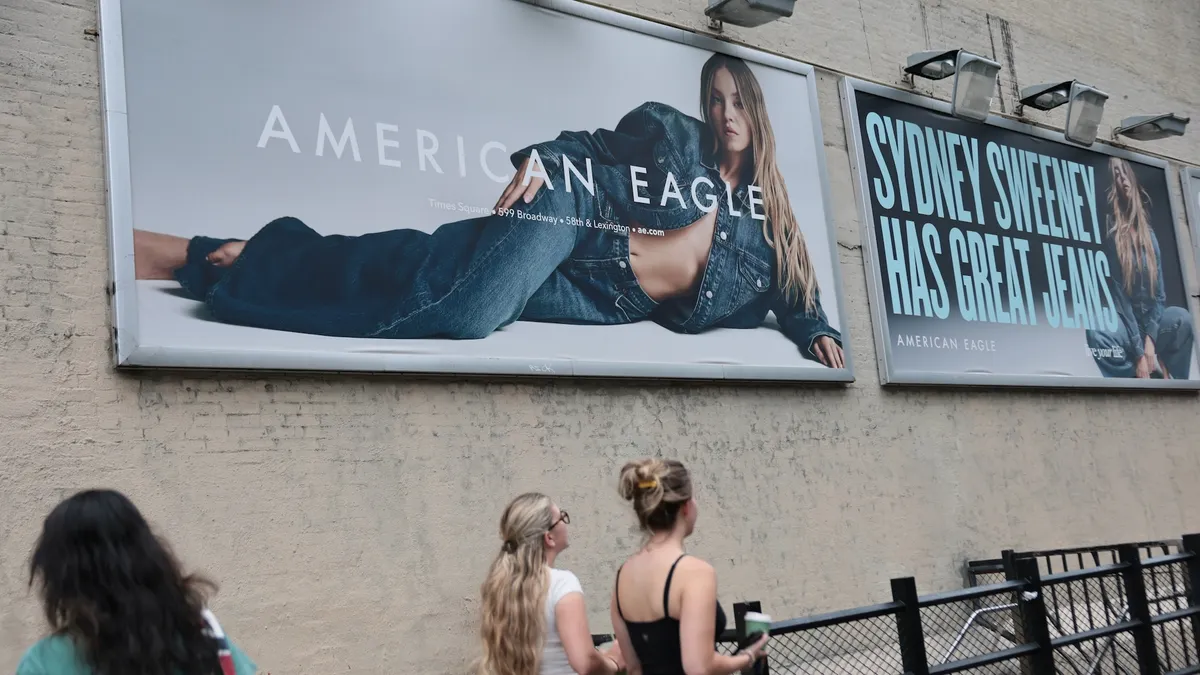NEW YORK — Patagonia has always been laser-focused on the environment. As concerns for the future environmental health of the planet reach a fever pitch, President and CEO Rose Marcario doubled down on change at the outdoor gear retailer during a panel at NRF's Big Show on Tuesday.
"The climate crisis — it's not a forecast anymore," she said. "It's real. It's happening."
Patagonia's response has been multi-faceted, but part of it involved changing the way that employees think about the company's mission. It is no longer just to do "no unnecessary harm" to the environment. The new mission statement embodies a responsibility to proactively do good.
It's displayed prominently on Patagonia's website and doesn't mince words: "We're in business to save our home planet." Patagonia has taken steps tied to that stated mission. The company made several efforts to help employees set aside time to vote, including shuttering all of its stores for a day, and the retailer used its first TV ad to fight against moves by the current administration to eliminate public lands.
For a period of time last December, in place of the typical product and company information, Patagonia's homepage featured a message that asserted "The President stole your land" and encouraged customers to take action in response. The retailer has also been vocal about customer involvement in environmental efforts and launched a program called Patagonia Action Works, which connects activists with grassroots causes.
Despite the fact that Patagonia has now explicitly vocalized its environmental values, Marcario isn't concerned about any injury to the brand. She says that rather than being more politically active than in the past, Patagonia is responding proportionally to recent threats and impacts to the environment in keeping with its mission.
"We've been funding activism for three decades. It's not really that different for us," Marcario said in response to questions about the company's political stance. She later noted that younger consumer bases are more aware and interested in those movements. "We really know our customers and they know us, and what I see more is that younger people are coming to the brand because they recognize the climate crisis in a much different way than my generation, probably, and their experience is really first-hand."
It's the consumer angle that presents real business upside for retailers, noted Scott Galloway, founder of L2 and professor of marketing at New York University's Stern School of Business, in a separate keynote. Among Galloway's predictions for 2019 was retailers' recognition of the benefits of appealing to a more socially conscious consumer with expendable income, a trend he summarized as "woke as a business strategy." The decision for many companies allows them to capture the spending of a large and growing population of urban dwelling progressives with money to spend, he said.
"Businesses are going to go increasingly woke over the next couple years. I'm not saying it's not a principled decision, but it's really more in my mind a shareholder-driven move," Galloway said.
Marcario placed a lot of emphasis on the actions Patagonia has taken internally to better its own processes. Most notably, she described Patagonia's efforts to make its supply chain carbon-neutral by 2025 and encouraged other retailers to do the same, arguing that the supply chain is "where all the issues are."
That's meant working with recycled cotton, polyester and down, among other materials, and trying to find more natural fibers to make clothing with, as well as pushing suppliers to adopt more sustainable practices.
"We've done a lot on building those supply chains and I think we all have to come to the reality that we are not going to have virgin supply chains forever because we are running out of resources," she said. "And as much as we don't want to face that or be in denial about it, it's true. So you have to be innovating."
The company's suppliers have been responsive so far to these efforts, Marcario said, noting that in some cases it's as simple as getting a supplier to use something like solar for electricity instead of coal.
Sustainability has gained traction in retail more broadly, with luxury companies coming under fire for practices that consumers find unacceptable, like burning unsold goods. Outdoor players have responded by investing in renewed or refurbished gear programs to both provide customers with cheaper options to purchase products and cut down on waste by ensuring that gear isn't being thrown away when it can be recycled instead.
That also factors into how products are built in the first place — durability is top of mind for Patagonia, as well as other outdoors companies like L.L. Bean and The North Face — and high-quality products can help avoid textile waste.
"We'll always make the best product because the best product is necessary to have a great company and a great brand, and it's the most responsible thing to do environmentally," Marcario said. "You know you build a durable product that lasts a long time."






















